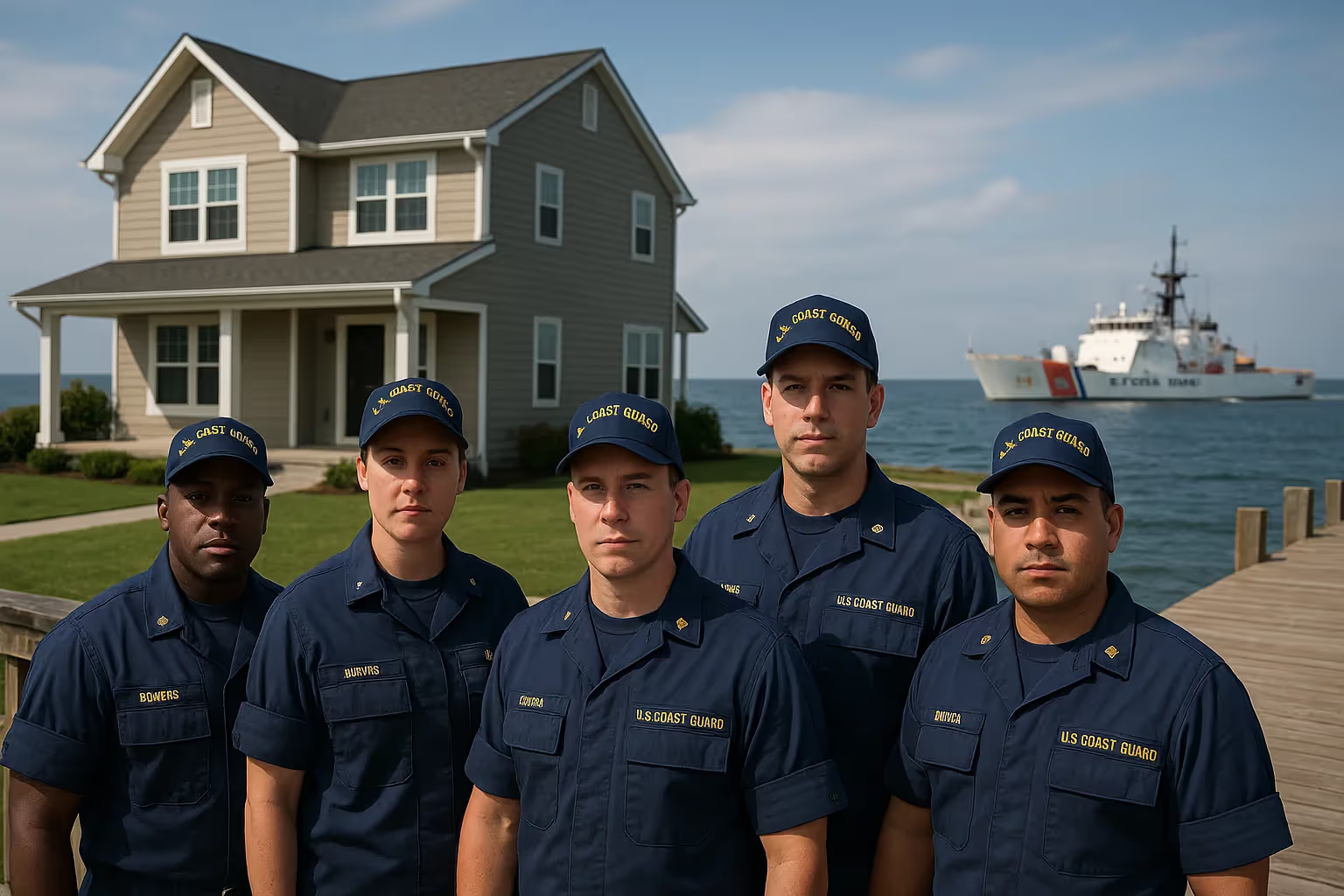Coast Guard VA Home Loan Benefits: Complete Guide for Maritime Service Members
November 19, 2025
.avif)
Coast Guard VA home loan benefits provide identical advantages to other military branches despite the Coast Guard's unique Department of Homeland Security affiliation rather than Department of Defense status. Understanding Coast Guard-specific eligibility requirements, deployment patterns, and career considerations helps maritime service members optimize their homeownership benefits alongside Navy, Air Force, Marine Corps, and National Guard counterparts. These comprehensive loan programs recognize Coast Guard service while accommodating unique operational requirements and assignment patterns.
Are you a Coast Guard member wondering if you qualify for VA loan benefits, or confused about how your service compares to other military branches for homeownership opportunities? Many Coast Guard personnel don't realize they have access to identical VA loan benefits as their Navy, Air Force, Marine Corps, and National Guard counterparts, including zero down payment options and competitive interest rates. Today we'll explore complete Coast Guard VA loan eligibility, examine how Coast Guard service patterns affect homeownership strategies, discuss coordination with other military branches' benefits, and reveal opportunities for National Guard and Reserve Coast Guard members. Whether you're active duty, Reserve, or veteran Coast Guard personnel, understanding these benefits can provide crucial support for your homeownership goals.
Coast Guard VA Home Loan Eligibility and Requirements
Coast Guard VA home loan eligibility follows identical standards to other military services despite the Coast Guard's Department of Homeland Security affiliation rather than Department of Defense status. Active-duty Coast Guard members qualify after 90 consecutive days of service during wartime or 181 consecutive days during peacetime, with these requirements matching Navy, Air Force, Marine Corps, and Army standards exactly.
Coast Guard Reserve eligibility requires six years of honorable service or 90 days of active duty mobilization, providing identical pathways to National Guard and other Reserve components across all military branches. Honorable discharge requirements and service period calculations follow standardized VA guidelines ensuring equal treatment regardless of Coast Guard's unique organizational structure.
Certificate of Eligibility (COE) processes for Coast Guard personnel utilize identical documentation and verification procedures as other services, with DD Form 214 serving as primary discharge documentation and Leave and Earnings Statements (LES) providing active-duty verification. Processing timelines and lender coordination remain consistent with other military branches, ensuring streamlined access to homeownership benefits.
Coast Guard Unique Service Patterns and Homeownership Impact

Coast Guard operational patterns feature unique deployment characteristics including cutter duty, shore-based assignments, aviation missions, and specialized training that create distinct homeownership considerations compared to other military services. Cutter rotations and extended patrol duties may require special consideration for property occupancy requirements and mortgage documentation during sea service periods.
Coast Guard station assignments often involve smaller installations and remote locations that may present limited housing markets and rental opportunities compared to larger military bases serving multiple service branches. Geographic isolation of some Coast Guard units requires careful market analysis before purchase decisions and property investment strategies.
Search and rescue missions, law enforcement operations, and environmental protection duties create unpredictable scheduling and emergency deployment patterns that may affect homeownership timing and property management during operational commitments. Coast Guard families benefit from understanding these unique demands when planning real estate investments and occupancy compliance.
Coast Guard Integration with Multi-Branch Military Benefits
Coast Guard personnel stationed at joint military installations alongside Navy, Air Force, Marine Corps, or Army units can access identical VA loan benefits while coordinating with other service members for housing market insights and professional networking. Joint base housing markets often provide diverse rental opportunities and strong appreciation potential due to multiple service populations.
Inter-service marriages between Coast Guard and other military branch personnel create opportunities for dual military benefits and coordinated homeownership strategies that leverage combined entitlements and career timing. Spouse coordination becomes crucial for optimizing loan benefits and managing geographic stability across different service assignment patterns.
Coast Guard Academy graduates and Officer Candidate School personnel often interact with other service academies and commissioning programs, creating professional networks that extend homeownership guidance and real estate opportunities beyond Coast Guard-specific resources. Cross-service mentorship provides valuable insights for long-term financial planning and property investment strategies.
National Guard Coast Guard Reserve Coordination
Coast Guard Reserve members benefit from geographic stability similar to Army National Guard, Air National Guard, and other Reserve components, allowing for long-term homeownership strategies and community investment often unavailable to active-duty personnel. Civilian employment integration provides income stability advantages for mortgage qualification and debt-to-income calculations.
Drill pay coordination with civilian income creates comprehensive qualifying income profiles that may exceed active-duty personnel in certain markets, though deployment activation can create temporary income disruptions requiring financial planning and lender understanding. Coast Guard Reserve pay scales and advancement opportunities contribute to long-term income growth supporting homeownership sustainability.
State maritime missions and federal activation requirements for Coast Guard Reserve units create deployment patterns that differ from Army National Guard or Air National Guard assignments, requiring specialized understanding of Coast Guard Reserve operations for optimal homeownership timing. Hurricane response, oil spill cleanup, and search and rescue activations may affect property occupancy and income calculations.
Coast Guard Career Progression and Real Estate Strategy

Coast Guard advancement opportunities through enlisted ratings and officer specialties create predictable income growth that supports long-term mortgage commitments and property investment planning. Technical ratings in electronics, engineering, and aviation often translate to high-paying civilian careers supporting post-military homeownership and real estate investment.
Coast Guard retirement planning at 20 years provides specific timelines for homeownership optimization and geographic flexibility for retirement location selection. Post-Coast Guard career opportunities in maritime industries, homeland security, and federal civilian service may influence retirement housing decisions and long-term investment strategies.
Coast Guard spouse employment challenges due to remote duty stations and frequent relocations may affect household income calculations, though online employment opportunities and portable careers can provide income stability throughout Coast Guard assignments. Military spouse preference hiring and education benefits support career development during Coast Guard service.
Coast Guard Installation Housing Markets and Investment Opportunities
Coast Guard installations near major ports including Miami, Seattle, Boston, and Los Angeles often feature strong real estate markets with appreciation potential and rental demand from civilian maritime industries. Urban Coast Guard units provide access to diverse housing options and investment opportunities beyond traditional military housing markets.
Remote Coast Guard stations in Alaska, Hawaii, and isolated coastal areas may present unique market challenges but also niche investment opportunities for Coast Guard families familiar with local conditions and market dynamics. Seasonal tourism and maritime commerce can create rental income opportunities in Coast Guard markets with vacation rental potential.
Coast Guard Academy area and training center locations provide stable rental markets due to consistent student and trainee populations, creating investment opportunities for Coast Guard families familiar with training cycles and housing demand patterns. Professional development programs and continuing education create ongoing housing needs supporting rental property investments.
Professional Support and Coast Guard-Specific Resources
Coast Guard Mutual Assistance (CGMA) provides financial counseling and emergency assistance that complements VA loan benefits, offering Coast Guard-specific guidance for homeownership planning and financial challenges. CGMA loan programs and educational resources support Coast Guard families throughout homebuying processes and financial transitions.
Coast Guard housing offices at major installations maintain VA loan information and coordinate with military family support centers to provide comprehensive homeownership education tailored to Coast Guard assignment patterns and operational requirements. Family support groups often share local market knowledge and homeownership experiences specific to Coast Guard communities.
Coast Guard Federal Credit Union and other military-focused financial institutions provide VA loan services with understanding of Coast Guard pay structures, deployment schedules, and unique financial circumstances. Specialized lenders familiar with Coast Guard operations can streamline processing and provide guidance throughout complex homeownership situations.
Coast Guard VA Loan Documentation and Processing Considerations
Coast Guard documentation requirements follow identical VA standards while accommodating unique service records and assignment histories that may require additional explanation during loan processing. Cutter service records and specialized duty assignments may need clarification for civilian lenders unfamiliar with Coast Guard operations.
Deployment documentation for Coast Guard personnel should clearly explain operational commitments, sea service requirements, and assignment patterns that affect occupancy compliance and property management during extended duties. Coast Guard-specific terminology and duty descriptions may require translation for lending professionals more familiar with other military branches.
Income verification for Coast Guard personnel includes specialized pay components such as sea pay, flight pay, and hazardous duty pay that contribute to qualifying income but may require explanation during underwriting processes. Coast Guard recruiters and personnel offices can provide documentation and verification support throughout loan application processes.
Coast Guard VA home loan benefits provide identical opportunities to other military services while accommodating unique service characteristics that require specialized understanding and strategic planning to optimize homeownership benefits throughout Coast Guard careers and veteran transitions.

Alex Chen

Alex Chen













Get in touch with a loan officer
Our dedicated loan officers are here to guide you through every step of the home buying process, ensuring you find the perfect mortgage solution tailored to your needs.
Options
Exercising Options
Selling
Quarterly estimates
Loans
New home

Stay always updated on insightful articles and guides.
Every Monday, you'll get an article or a guide that will help you be more present, focused and productive in your work and personal life.









.png)
.png)
.png)
.avif)
.avif)
.avif)
.png)
.png)
.png)
.avif)
.png)
.png)
.avif)
.png)
.avif)
.png)
.avif)
.avif)